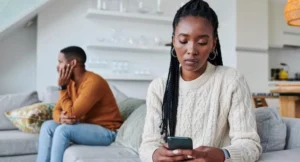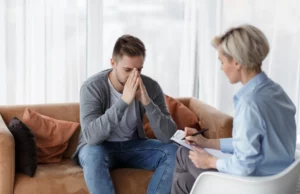Relationships are an integral part of our lives, shaping our emotions, experiences, and overall well-being. However, not all relationships are created equal, and sometimes we find ourselves in a one-sided dynamic. One-sided relationships can be challenging and emotionally draining, but there are strategies and insights, and thus one-sided relationship advice comes into play. In this article, we will explore the signs of a one-sided relationship, and understand its impact.
Contents
Understanding A One-Sided Relationship
 A one-sided relationship refers to a situation where one person invests more time, effort, and emotional energy into the relationship compared to the other person. It is characterized by an imbalance of give and take, where one individual is predominantly on the receiving end while the other is constantly.
A one-sided relationship refers to a situation where one person invests more time, effort, and emotional energy into the relationship compared to the other person. It is characterized by an imbalance of give and take, where one individual is predominantly on the receiving end while the other is constantly.
In a one-sided relationship, the person who invests more may constantly initiate communication, plan activities, and make compromises to accommodate the other person’s needs. They may feel emotionally drained and unfulfilled because their efforts are not reciprocated or appreciated by their partner or friend.
Several factors can contribute to a one-sided relationship. One possibility is that the other person may be unaware of the imbalance or not prioritize the relationship as much as the other person does. They might have different expectations, interests, or commitments that prevent them from investing equally in the relationship.
Can A Relationship Work If It’s One-Sided?
 In general, a relationship that is consistently one-sided is unlikely to work in the long term because it requires efforts from both sides.
In general, a relationship that is consistently one-sided is unlikely to work in the long term because it requires efforts from both sides.
Here are some points to explain it a bit deeper:
- Lack of emotional support: In a healthy relationship, both partners should provide emotional support to each other. If only one person is consistently giving while the other is not reciprocating, the emotionally burdened partner may feel neglected, unheard, and emotionally drained.
- Resentment and dissatisfaction: Over time, the person who feels their efforts are not being reciprocated may develop resentment towards their partner. This can create a negative atmosphere, erode trust, and ultimately lead to dissatisfaction within the relationship.
- Lack of growth and personal development: A healthy relationship should support the personal growth and development of both partners. If the relationship is one-sided, where only one person’s needs, goals, and aspirations are prioritized.
- Communication breakdown: Effective communication is crucial in any relationship. When a relationship becomes one-sided, it often indicates a breakdown in communication. The person who feels neglected may hesitate to express their needs and concerns, fearing they will not be heard or understood.
While every relationship has its ups and downs, a healthy and sustainable partnership requires mutual effort and commitment from both individuals involved. It’s important to address any imbalances early on and have open and honest conversations about each person’s needs and expectations.
Is It Better To End A One-Sided Relationship?
 Yes, it is generally better to end a one-sided relationship. Ending such a relationship can be a difficult decision, but it is often the healthier and more empowering choice for several reasons.
Yes, it is generally better to end a one-sided relationship. Ending such a relationship can be a difficult decision, but it is often the healthier and more empowering choice for several reasons.
Here we have mentioned a few crucial points:
- Self-worth and happiness: Remaining in a one-sided relationship can have a detrimental impact on your self-esteem and overall happiness. It is important to value yourself and be in a relationship where your needs are acknowledged, respected, and fulfilled.
- Emotional well-being: Being in a relationship where you constantly give without receiving can lead to emotional exhaustion, stress, and unhappiness. Ending the one-sided relationship provides an opportunity to focus on your emotional well-being and rebuild your sense of self.
- Growth and personal development: Ending a one-sided relationship can be a catalyst for personal growth and development. It allows you to reflect on what you truly desire in a relationship and learn from the experience.
- Building healthier relationships: Leaving a one-sided relationship gives you the chance to learn from the experience and understand the importance of equal effort, communication, and reciprocity in a relationship.
- Reducing resentment and unhappiness: Staying in a one-sided relationship can lead to growing resentment and unhappiness over time. These negative emotions can impact your overall well-being and seep into other areas of your life.
It’s important to remember that ending a relationship is a personal decision and can be influenced by various factors. Seeking support from trusted friends, family, or professionals such as therapists can help you navigate the process and make a decision that aligns with your well-being and long-term happiness.
When To Get A Professional Help?
 Knowing when to seek professional help is essential when dealing with relationship issues. Especially when an individual is indulged in a one-sided relationship.
Knowing when to seek professional help is essential when dealing with relationship issues. Especially when an individual is indulged in a one-sided relationship.
Here are some indicators that it may be beneficial to consult a professional:
- Persistent distress: If you consistently feel overwhelmed, distressed, or emotionally drained. Due to the dynamics of a relationship, it could be a sign that the issues are deeply rooted and require professional guidance.
- Emotional or physical abuse: If you are experiencing any form of emotional, verbal, or physical abuse in the relationship. It is crucial to seek professional help immediately. A professional can provide support, guidance, and resources to help you safely navigate the situation.
- Patterns of unhealthy relationships: If you find yourself repeatedly entering into or staying in one-sided or toxic relationships. It may indicate deeper underlying issues that could benefit from professional intervention. A therapist can help you explore patterns, develop self-awareness, and learn healthier relationship dynamics.
- Lack of progress: If you have made consistent efforts to improve the relationship, set boundaries, and communicate your needs, but there is little to no progress or change, professional guidance may be necessary. A trained therapist can provide objective insights and help navigate the complexities of the relationship.
- Decision-making difficulties: If you are struggling to make decisions regarding the relationship’s future. Just seeking professional help can provide you with a neutral space to explore your feelings. Also, clarify your values, and gain insight to make informed choices.
Remember, seeking professional help is not a sign of weakness but rather a courageous step toward growth. Along with healing, and improving your well-being. A licensed therapist or counselor can provide valuable support, guidance, and tools to help. While navigating the challenges within your relationships.
Conclusion
In navigating a one-sided relationship, it’s crucial to prioritize your needs, establish clear boundaries, and communicate assertively. Take care of your well-being, seek support from trusted individuals, and assess the overall balance in the relationship. If you experience persistent distress, ineffective communication, or a pattern of unhealthy relationships, consider seeking professional help. Therefore, if an individual fall for some without their consent, it is required to take one-sided Relationship Advice. Remember, you deserve a relationship that is mutually fulfilling and balanced, where your needs are valued and reciprocated.
Relationships are complex, and it’s natural for issues to arise along the way. If you have any queries regarding Relationship Counseling experienced therapists at CoupleMantra can help: Book a trial couple therapy session.


